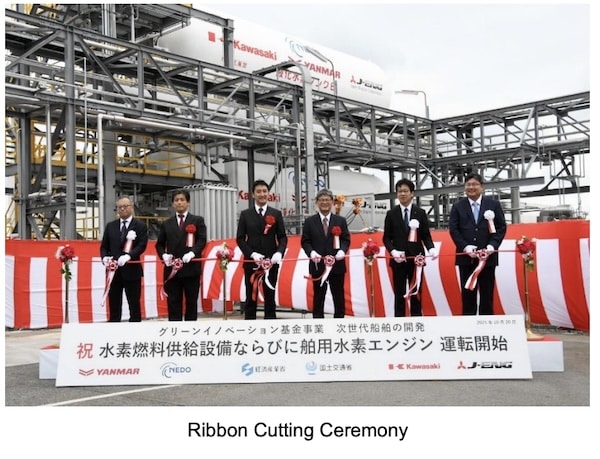Japan Pioneers Hydrogen Engine Technology

Kawasaki Heavy Industries, Yanmar Power Solutions, and Japan Engine Corporation have achieved a significant milestone by conducting the world’s first land-based operation of marine hydrogen engines. This groundbreaking demonstration took place at Japan Engine’s headquarters, utilizing a newly installed liquefied hydrogen fuel supply system. The initiative is part of Japan’s broader commitment to carbon neutrality by 2050, as outlined in the Green Innovation Fund Projects.
Innovative Steps Towards Decarbonization
The demonstration of hydrogen engines is a key component of the Green Innovation Fund Projects, which aim to accelerate innovation in the energy and industrial sectors. Launched by the Japanese government in October 2020, this initiative is managed by the New Energy and Industrial Technology Development Organization (NEDO) and is backed by a substantial JPY 2 trillion fund. This funding supports ambitious decarbonization projects, including research, development, and practical implementation of new technologies.
In recent years, the government has allocated additional budgets of JPY 300 billion for fiscal year 2022 and JPY 456.4 billion for fiscal year 2023 to further these efforts. NEDO has established a dedicated website to provide updates and share information about the projects funded under this initiative.
As part of the marine hydrogen engine development, Kawasaki Heavy Industries has created a liquefied hydrogen fuel supply system capable of storing and gasifying liquid hydrogen. This system can supply hydrogen at both high and low pressures to various engine types developed by the collaborating companies. The successful demonstration of hydrogen combustion in medium-speed four-stroke engines marks a significant step toward achieving zero emissions in marine applications.
Future Directions and Collaborations
Looking ahead, Japan Engine Corporation is set to advance the development of a low-speed two-stroke hydrogen engine, with operations expected to commence in Spring 2026. All three companies involved in this project share a common goal: to significantly reduce greenhouse gas emissions while ensuring operational flexibility through a dual-fuel system that can switch between hydrogen and diesel as needed.
Following the successful land-based demonstrations, Kawasaki Heavy Industries, Yanmar Power Solutions, and Japan Engine Corporation plan to collaborate with shipowners and shipyards to conduct onboard trials. This collaborative effort aims to facilitate the practical implementation of hydrogen-fueled ships, positioning Japan as a leader in the global transition to sustainable maritime technology and contributing to the country’s goal of carbon neutrality by 2050.
